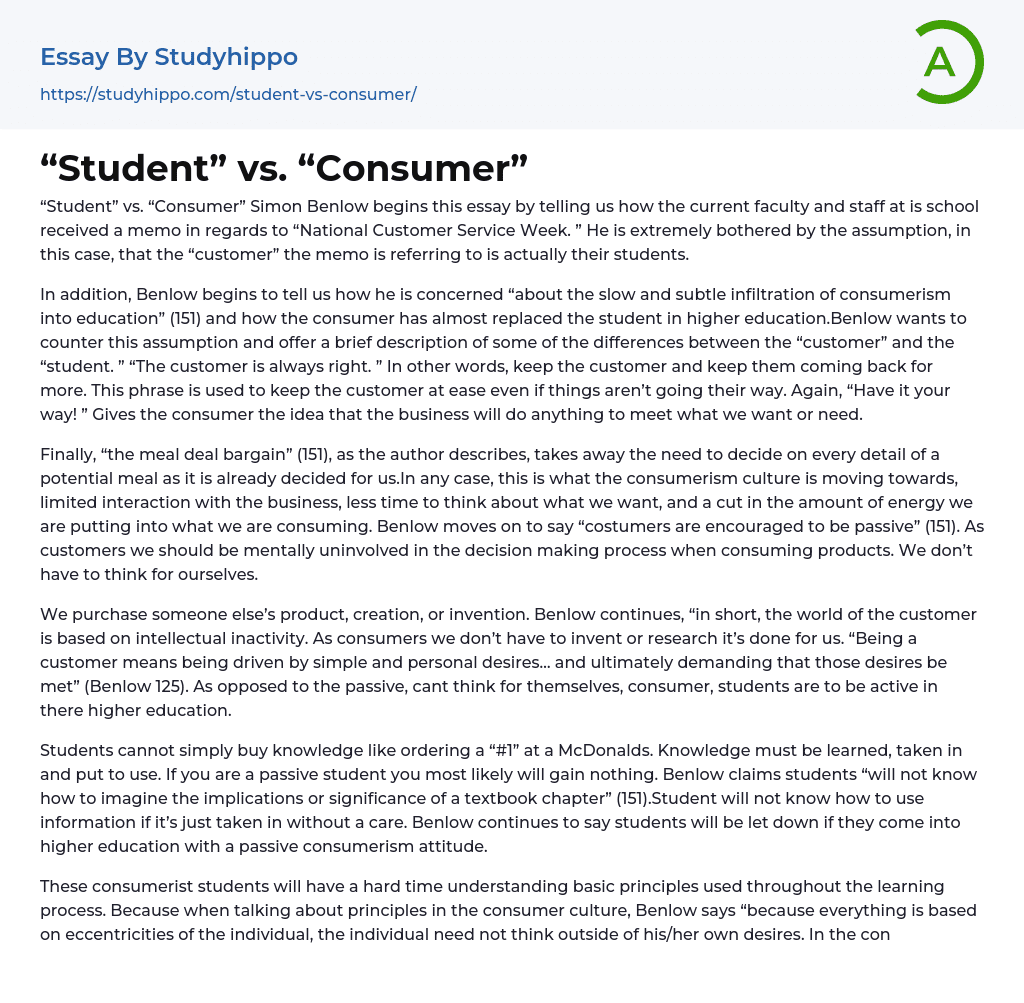“Student” vs. “Consumer” Simon Benlow begins this essay by telling us how the current faculty and staff at is school received a memo in regards to “National Customer Service Week. ” He is extremely bothered by the assumption, in this case, that the “customer” the memo is referring to is actually their students.
In addition, Benlow begins to tell us how he is concerned “about the slow and subtle infiltration of consumerism into education” (151) and how the consumer has almost replaced the student in higher education.Benlow wants to counter this assumption and offer a brief description of some of the differences between the “customer” and the “student. ” “The customer is always right. ” In other words, keep the customer and keep them coming back for more. This phrase is used t
...o keep the customer at ease even if things aren’t going their way. Again, “Have it your way! ” Gives the consumer the idea that the business will do anything to meet what we want or need.
Finally, “the meal deal bargain” (151), as the author describes, takes away the need to decide on every detail of a potential meal as it is already decided for us.In any case, this is what the consumerism culture is moving towards, limited interaction with the business, less time to think about what we want, and a cut in the amount of energy we are putting into what we are consuming. Benlow moves on to say “costumers are encouraged to be passive” (151). As customers we should be mentally uninvolved in the decision making process when consuming products. We don’t have to think for ourselves.
We purchase
someone else’s product, creation, or invention. Benlow continues, “in short, the world of the customer is based on intellectual inactivity. As consumers we don’t have to invent or research it’s done for us. “Being a customer means being driven by simple and personal desires… and ultimately demanding that those desires be met” (Benlow 125). As opposed to the passive, cant think for themselves, consumer, students are to be active in there higher education.
Students cannot simply buy knowledge like ordering a “#1” at a McDonalds. Knowledge must be learned, taken in and put to use. If you are a passive student you most likely will gain nothing. Benlow claims students “will not know how to imagine the implications or significance of a textbook chapter” (151).Student will not know how to use information if it’s just taken in without a care. Benlow continues to say students will be let down if they come into higher education with a passive consumerism attitude.
These consumerist students will have a hard time understanding basic principles used throughout the learning process. Because when talking about principles in the consumer culture, Benlow says “because everything is based on eccentricities of the individual, the individual need not think outside of his/her own desires. In the consumer culture our minds almost seem to be made up for us, as a student the sky is the limit. Students in higher education are asked to think outside the box, and to invent or break the rules.
Benlow says “they need to understand that certain principles exist in the world outside of their own desires. ” As Benlow reflects, he can’t help but respect his teachers
for making them think for themselves rather then being passive and going with the flow. They insisted on active students; they made us read staggering amounts of material and then actively put that material to use” (Benlow 152). These teachers made their student think for themselves and be creative with the material.
Benlow feels that if the terms “customer” and “student” are intertwined that the student will become ignorant to the difference between each culture. He is in fear of higher education becoming more passive and students coming to the point where they do not think for themselves
- Academia essays
- Higher Education essays
- Language Learning essays
- Studying Business essays
- Education System essays
- Study essays
- First Day of School essays
- Scholarship essays
- Pedagogy essays
- Curriculum essays
- Coursework essays
- Studying Abroad essays
- Philosophy of Education essays
- Purpose of Education essays
- Brainstorming essays
- Educational Goals essays
- Importance Of College Education essays
- Brown V Board of Education essays
- The Importance Of Higher Education essays
- Online Education Vs Traditional Education essays
- Academic And Career Goals essays
- Academic Integrity essays
- Brown Vs Board Of Education essays
- Distance learning essays
- Technology in Education essays
- Vocabulary essays
- Writing Experience essays
- Importance of Education essays
- Early Childhood Education essays
- Academic Degree essays
- Academic Dishonesty essays
- School Uniform essays
- Academic writing essays
- Cheating essays
- Bachelor's Degree essays
- MBA essays
- College Life essays
- Grade essays
- Diploma essays
- Phonology essays
- Sentence essays
- Filipino Language essays
- Pragmatics essays
- Millennium Development Goals essays
- History Of Education essays
- Graduate School essays
- Middle School essays
- School essays
- Special Education essays
- University essays




